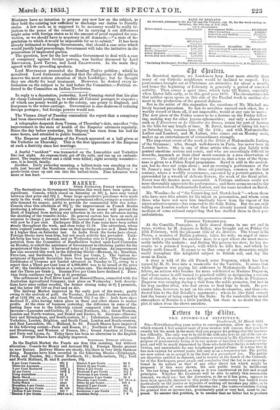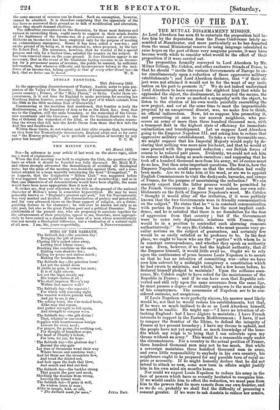rrittro t t1 than.
THE INCOME-TAX DIFFICULTY.
Sin—Notwithstanding your notice to correspondents, allow me to say, in which remark I feel assured most of your readers will concur, that you have exactly hit the mark in the mode that you propose for getting over the Income- tax difficulty. The only way to be rid of the difficulty is to be rid of the tax al- together. If so, an attempt at modification or revision by Mr. Gladstone for the purpose of permanently fixing it in our system of taxation will cause great re- gret, and will be much deprecated by those who hold that the tax is inherently vicious, and unworkable for any lengthened period of time. It is true that it has now existed for several years, but only so as a temporary tax. The public are now called on to accept it in the form of a permanent tax. The public are therefore entitled to demand, and to receive at the hands of the Chinioel- lor of the Exchequer, proof ample and conclusive that the tax is as unexcep- tional in its nature as that of any other direct tax which might be proposed : if this were shown, the said public would be indifferent to the tax being instituted, so long as it was constructed on fair and sound principles. Whether Mr. Gladstone will be able to satisfy this reasonable demand, we shall see : but the discussion, so far as it has gone, appears to have been specially directed to this point—the controversy has turned more particularly on the justice or injustice of making all incomes pay alike, or to the consideration of some modified income-tax ; the controversialists taking for granted that an income-tax, proximately good or very bad, must be im- posed. To assume this position, is to 8.81R11110 that no better tax to produce the same amount of revenue can be found. Such an assumption, however, cannot be admitted. It is therefore surprising that the opponents of the tax have so narrowed their ground as to talk of modification and alteration, when they should demand abolition. The difficulties encountered in the discussion, by those most desirous and earnest in reconciling them, ought surely to suggest in their minds doubts of the legitimacy of the Income-tax as a permanent source of revenue. Hitherto an income-tax has been employed only for the purpose of meeting an extraordinary emergency. Hence it has been called a war-tax ; and on the ground of its being so, it was objected to, when proposed, by the late Sir Robert Peel. His assurance, however, that he wanted it for a special purpose and only for a limited time, satisfied the country on the subject. It has been renewed since on the same ground. It does therefore appear to me necessary, that in the event of Mr. Gladstone having recourse to an income- tax for a permanent source of revenue, the public be assured, by sufficient information,. that whatever difficulty and inconvenience belong to the inci- dence of an income-tax, belong equally to that of every other direct tax—in

























 Previous page
Previous page